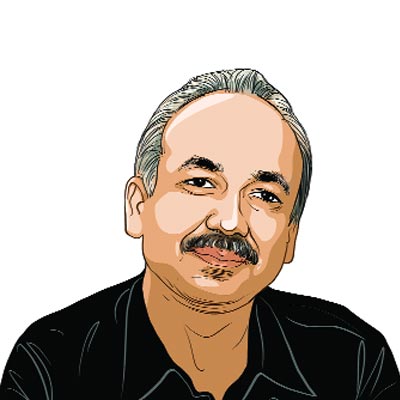Opinion Speaking in forked tongues
Maoist leaders like Prachanda had perfected their doublespeak promising peace to some,and instigating others to violence.
After nearly five years,the Unified Communist Party of Nepal-Maoists (UCPN-M) now appears cornered. The party is left with limited options: either to declare that the peaceful,democratic platform it chose was only tactical,or to prove with matching action that the idea of armed battle and their dreams of capturing power have been abandoned for ever. Any ambiguity would mean that the Maoists have no faith in the democratic order. Doublespeak has been both the strength and the downfall of Maoist leader Prachanda,both in the eyes of the Nepalis as well as the international community. They empathised when Prachanda privately told them his predicament having to cajole young people with a different political upbringing- but within his partys in-camera meetings,he would send the message that they should not forget the ultimate objective of establishing a peoples republic,for which they were free to buy arms,indulging in violence and do anything that a revolution would demand. In fact,Prachanda was no exception. Baburam Bhattarai (who has apparently fallen out with Prachanda) said a year ago,in an interview with a pro-Maoist journal published from England and Ireland,that the party had not made any compromise,had its arms and army intact,and would go for a strike the moment confusion among the bourgeois forces gets to its peak. The Maoists have been able to exploit the situation mainly because of the lust for power among major political parties in Nepal. While parties like the Nepali Congress and the Communist Party of Nepal-Unified Marxist Leninist (CPN-UML) have grasped the situation now,the international community is also coming around to the same view.
India,which mediated to bring the Maoists to the peace process with high hopes,has not only withdrawn its trust in the former rebels,it has also been telling international partners and Nepali actors that thinking the Maoists will stick to their commitment to adhere to peace and democratic norms was an error of judgment on our part. If that is the case,it is a clear repudiation of its twin-pillar theory encouraging constitutional monarchy and pro-democracy forces to work together and its patronage of the Maoists as legitimate representatives of the people. WikiLeaks outed Indian Foreign Secretary Nirupama Raos alleged disclosure that India has failed to win the support of Nepals Maoists despite having paid them. This indicates the extent to which India is upset with the Maoists. In addition,the growth and spread of Maoist violence in India,and the suspected link between the Maoists of the two countries,has widened the rift. Any future step by Nepals Maoists that contradicts the promise made to India when it mediated between them and Nepals pro-democracy forces in November 2005,would impact Indias approach to Nepal. In other words,the UCPN-M and its top leadership must unambiguously state and prove by action that the use of arms is history,and that it is committed to democracy,pluralism and peace. But will Prachanda listen? He has asked the All Nepal National Free Students Union (ANNISU-Revolutionary),the Maoists student wing,to prepare for mass revolt, violent if necessary,even as the partys labour wing demands a 121 per cent rise in wages of employees at all levels in factories,public and private. If the management fails to deliver,industrial production will grind to a standstill. The Nepali Congress and the CPN-UML have said in so many words that Maoists do not want the peace process to proceed and that a decisive battle is inevitable,but their fighting words rest on the strength of the Nepal army rather than the combined ability and strength of their cadres. With the United Nations Mission to Nepal (UNMIN) now certain to exit by the third week of January,the vexed issue of integration and rehabilitation of the Maoist combatants will remain unresolved. And the Nepal army,which has been treated as at par with that of the Maoists in the sense that both armies remained confined to their designated camps and barracks as long as the UNMIN was here will revert to pre-UNMIN status.That is sure to invite further tussles between the state army and the Maoists. And as for Prachanda,a flexible pro-peace approach would be acceptable only so long as he can be in power. All this may not be a pleasant scenario for Nepals political future. The resurgence of internal conflict will extract a heavy cost,as Nepal knows from bitter experience. A promise of peace and the threat of armed revolt cant go together. That only discredits the countrys politics and its standing in its immediate neighbourhood and in the wider international arena.
yubaraj.ghimire@expressindia.com





